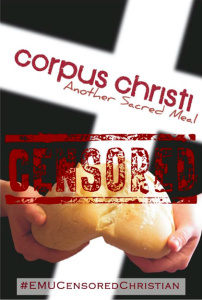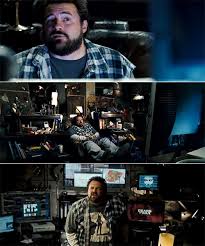 It is not, sad to say, news that controversy has surrounded a production of Terrence McNally’s Corpus Christi. It is certainly not surprising to hear that such controversy took place on a university campus. But when one hears that Corpus Christi became the subject of controversy as a result of a production at a Christian faith-based university, the reflex is to wonder how anyone ever thought it could be done there in the first place. But the production of Corpus Christi that was to have been produced this past weekend at Eastern Mennonite University in Virginia reveals a situation that demands something more than a reflexive scoff, as it reveals a great deal about the struggle between the tenets of faith and academic freedom, between traditional ways and where our society is in the 21st century.
It is not, sad to say, news that controversy has surrounded a production of Terrence McNally’s Corpus Christi. It is certainly not surprising to hear that such controversy took place on a university campus. But when one hears that Corpus Christi became the subject of controversy as a result of a production at a Christian faith-based university, the reflex is to wonder how anyone ever thought it could be done there in the first place. But the production of Corpus Christi that was to have been produced this past weekend at Eastern Mennonite University in Virginia reveals a situation that demands something more than a reflexive scoff, as it reveals a great deal about the struggle between the tenets of faith and academic freedom, between traditional ways and where our society is in the 21st century.
The basic facts are this: Christian Parks, a senior majoring in theatre at Eastern Mennonite University (EMU) proposed as his senior project a production of Corpus Christi, which was, according to him, approved by the school’s theatre faculty in the spring of 2014. Since January, due to increasing concerns by the school administration over the content of the play, Parks was called into a series of meetings about the play, which escalated from expressing concern to reducing the number of performances from four to two and severely limiting who would be permitted to attend to the show being completely canceled. It seems to echo many cases of academic theatre censorship, although there appears to have been significantly more dialogue surrounding the process as it accelerated – and how the final decision was made, and by whom, seems unique in my experience.
* * *
For those unfamiliar with Corpus Christi, it is McNally’s 1998 play in which he reimagines the story of Jesus as told and enacted by 13 gay male friends in the present day. When it was first announced for its premiere at the Manhattan Theatre Club, it was thrust into the center of controversy over its content – which few people had seen or even read – resulting in violent threats against MTC and the production, causing it to be briefly canceled and then restored, with strong protests outside the theatre during its run and security measure put in place to protect the theatre, the show and its patrons.
The play subsequently had numerous productions around the country, many which had their own controversies where it played, again, often over what people imagined to be the content rather than the play itself. It has been produced at colleges and universities, provoking similar reactions. Now, 17 years later, the play is produced intermittently, hardly surprising for any play that, in its way, had such a huge “moment” in the late 90s.
Writing of the play in the preface to the trade paperback edition, McNally describes it as follows:
Corpus Christi is a passion play. The life of Joshua, a young man from south Texas, is told in the theatrical tradition of medieval morality plays. Men play all the roles. There is no suspense. There is no scenery. The purpose of the play is that we begin again the familiar dialogue with ourselves: Do I love my neighbor? Am I contributing to the good of the society in which I operate or nil? Do I, in fact, matter? Nothing more, nothing less. The play is more religious ritual than a play. A play teaches us new insight into the human condition. A ritual is an action we perform over and over because we have to. Otherwise we are in danger of forgetting the meaning of the ritual, in this case that we must love one another or die. Christ died for all of our sins because He loved each and every one of us. When we do not remember His great sacrifice, we condemn ourselves to repeating its terrible consequences.
All Corpus Christi asks of you is to “look at what they did to Him. Look at what they did to Him.” At the same time it asks you to look at what they did to Joshua, it asks that we look at what they did one cold October night to a young man in Wyoming as well. Jesus Christ died again when Matthew Shepard did.
* * *
The play is set in the present day and employs language that might raise concerns within religious groups, but McNally’s message of dialogue and ritual seems particularly well suited to the discussion of faith in present day life. That said, it helps to know something about the Mennonites. Here I’ll draw from the website of Mennonite Church USA.
Mennonites are Anabaptists
We are neither Catholic nor Protestant, but we share ties to those streams of Christianity. We cooperate as a sign of our unity in Christ and in ways that extend the reign of God’s Kingdom on earth.
We are known as “Anabaptists” (not anti-Baptist) – meaning “rebaptizers.” The Anabaptist movement began in the 16th Century in Europe.
To defuse a commonly held misconception I also draw from their website the following
Mennonites are not Amish
We find that many people asking about Mennonites are actually thinking of the Amish or “Old Order Mennonites.” Mennonites and Amish come from the same Anabaptist tradition begun in the 16th century, but there are differences in how we live out our Christian values. The distinctiveness of the Amish is in their separation from the society around them. They generally shun modern technology, keep out of political and secular involvements and dress plainly.
It is important to know, however, that there is great debate within the Mennonite community about the acceptance and role of LGBTQ followers, which has historically been one of exclusion. However, as in so many faiths, there is a strong contingent of Mennonites who want to see the church change its ways, and there are groups working to bring that about. But there is no agreement.
* * *
Christian Parks first proposed doing Corpus Christi as his senior project two years ago, inspired by seeing a production of the play in San Francisco by 108 Productions as part of their “I Am Love” effort to bring the play and its message to communities around the country, including communities of faith.
“There is an application process,” Parks explained, describing the theatre department’s standard procedures, “where I give them the name of the script. I also give them the reasons why I’m doing the project. I also give them a budget that I had to pre-balance, so that they knew where I was going to spend my money. Then we began more discussions after the script had a read-through and that’s when the conversations about this being a student lab production entered in. That entails making sure there’s a talkback, a way for the audience to process the show after every performance and it also means the department will not collectively advertise this outside the campus.”
Parks explained that a lab production is a full production, with four performances, and that while it may not be advertised off campus, the local community may attend. He then said, “I got approval when the season was approved, in the spring of 2014. Surprisingly enough, the administration is mailed every season that gets approved and this show was on the list.”
Asked as to whether he was aware of the play’s controversial past, he said, “In the fall, I began my senior thesis, which is the theoretical part which goes along with the production. I wrote a conceptual, theorized piece using poor theatre and Grotowski and using some other things that had more to do with the ritual side of Corpus Christi. I actually had to dive into the script and look at past performances, where this had been and the controversy that has been around it. So yes, I was very aware of everything that was around Corpus Christi. But it was a lab production, so that was the clearance, or should I say the filter, in which I said that ‘Yes, this is a thing but we’re doing it as a lab production. That will be alright.”
Had Parks considered that the play might not be approved?
“It was a little iffy because I’m in a religious community and an especially close-knit one like the Mennonites. The university, according to the process we went through last year, was ahead of the church, so I knew that on the church denominational level will do whatever it does, and yes it’s going to make some conflict, but that’s OK because there’s enough people who can take care of that.”
“The process” Parks refers to was a “Listening Process” on the EMU campus in 2014, which sought to address issues relating to LGBTQ representation, particularly among the faculty. After six months, the school deferred formal action on hiring policy. Parks’s proposal was being considered by the theatre faculty during this time.
“I wasn’t aware,” he said, “that there was enough harm and enough pain and enough tension in the process that we went through, because in the spring of 2014 we approved it as a department in the middle of the listening process. It seemed, especially with the concept around the show, as if it would fit the culture that we were in and becoming.” Asked about his reference to “pain and hurt,” Parks explained that he was referring to situations that arose, “any time you have a lot of straight people talking about queer and gay bodies, and just constantly being under the microscope as they figure out what to do with us. So this show was a way of finally putting our voice at the table that they tried to do with us last year, but it didn’t really work because they still don’t understand and don’t want to understand.”
* * *
Parks said that conflict over the play began when he put out his audition notice at the beginning of January, which included a description of the play. Parks then described a series of meetings that he was called to by the administration beginning in late January. The first two were led by the Provost and Academic Dean; at the first, Parks said he was made aware of “concerns” and was asked to provide the script. He said that the provost subsequently stated that he never completed reading it, having stopped at the play’s nativity scene, at roughly page 20. Parks was also asked for his director’s notes and his advisor was asked for an explanation of the standard lab process.
At the second meeting, a week later, he said “We prepared a resource list and they took four or five of their resources and I took four or five of my resources and we were going to synthesize them together for people who might have more questions and might need places to go.” Parks also said that at that time, there was some concern as to whether he could field a full cast, and that the possibility of a reading instead of a full production, which would require less rehearsal, came up, but that he quickly thereafter secured a full cast and notified the theatre department that a production would be possible as originally planned. At a third meeting, this one called by the president, following a weekend meeting by the president’s cabinet, he was given a choice.
“The two decisions that they laid on the table for me was that either they would shut it down completely or, on the basis of academic integrity, they would confine the show to the classroom so that it would become a classroom endeavor which meant one performance at one time with a select group of people, a select group of classes and classes that were already dealing with subjects around sexuality conflict and faith. We compromised and went with one day instead of one performance and so there was a three o’clock and an eight o’clock performance. That is what we settled on and that each of these classes would get a ticket and only people who would be allowed to enter the theatre would be the people with a ticket, which meant that we would have to turn away anyone who came from the community and anyone who was a student but didn’t have a ticket.”
Following this decision, the restrictions on attendance were announced.
“It went on Facebook,” said Parks, “The theatre department had to tell people and that got out quicker than wildfire and what that means is that all of the justice connections that I have got whiff of it. People were angry and they went to social media to get out their anger. That is when I got called in for another meeting, Wednesday the 18th.”
This is now just prior to the two remaining scheduled performances, set for February 21.
* * *
I reached out to several people, via e-mail, in the EMU administration about the Corpus Christi situation. I did not receive a reply from Heidi Winters Vogel, Parks’s advisor and an associate professor, and my inquiries to the university president Loren Swartzendruber and provost Fred Kniss were referred to Andrea Wenger, Director of Marketing and Communications for the school. I should note that Wenger attempted to schedule direct conversation between me and the provost, however his schedule and my own were in conflict, and Wenger accepted and responded to my questions via e-mail at my suggestion in the interest of expediency.
I asked Wenger when the administration first became concerned about Corpus Christi and whether it was their practice to alter academic efforts in response to complaints over previously approved content.
She wrote, “Administrative leadership became aware of the play – and its controversial history – in mid-January. It is not the school’s practice to ‘alter academic efforts in response to complaints about previously approved academic content.’ Production of the play hadn’t been reviewed or approved by department leadership or administration prior to mid-January.”
Wenger explained that, “Public performances were cancelled by the president’s cabinet when administration learned that what they had been assured in mid-January would be a staged reading with no publicity morphed into a full-blown production.” Responding to my question about limiting attendance, she said, “The student involved intended to sell tickets to this show. He anticipated off-campus interest and support even with limited publicity. The administration cut the performance schedule from four performances over three days to two performances on one day with an invitation-only audience
She further said, regarding the timing of the process, “The administration first became aware of the planned staging in recent weeks. Administration is evaluating the process of how the play was selected and vetted. EMU students are given freedom to choose productions that explore controversial topics as part of a rigorous academic program.
A report on the cancelation of the play in the school newspaper quoted Swartzendruber as citing threats of violence over the play, although he acknowledged that those had been over other productions, and none had been made at EMU. Asked about this, Wenger responded, “Given the history of this play’s controversial nature – which in some settings has generated threats of violence – EMU leadership took the action that they believed was in the overall best interests of students’ safety and well-being. Leadership had enough information to be concerned about the possibility of disruption.”
* * *
 Which brings us to the cancelation.
Which brings us to the cancelation.
The EMU student newspaper ran their story, on Thursday, February 19, with the headline, “Parks Cancels ‘Corpus Christi’ Over Controversy,” saying that the decision was his, not the administration’s. Regarding the accuracy of this account, Parks returned to the meeting of February 18.
“After hearing what was going on,” he said, “and after doing some strategic planning in my mind, that is when I went in and I knew that they were going to shut it down. I knew. And so instead of the story being written as they shut it down, I’d rather it be written as I took it down, because I refuse to be a victim. I refuse, I refuse. So that’s when I made the decision, Wednesday the 18th, that Corpus Christi is coming down and we would not be having the performance and so I went back and told my cast.
I wondered whether Parks had jumped the gun, and asked Andrea Wenger whether the administration would have permitted the performances to go on had Parks said he was canceling them
“No,” Wenger replied. “The invitation-only performances were to be cancelled; administration believed this to be in the overall best interests of EMU students’ safety and well-being. Administration had enough information to be concerned about the possibility of disruption — especially when it became apparent that the students were proceeding with a full production versus a staged reading as originally planned.”
That statement stands in relief against a university wide communication by Wenger on behalf of Swartzendruber on February 18 which read, in part, “Despite the nature of the play, which varies from the university’s theological and biblical understandings, the cabinet sought to protect academic freedom and honor the student project as an academically engaging activity intended primarily for an internal audience,” then citing Parks’s decision as coming in the wake of the “intense reaction to the planned staging.” It doesn’t point out that the intense reaction was coming, at least in part, from the administration itself.
So no matter what had took place, and who spoke first, Corpus Christi wasn’t going to be seen at Eastern Mennonite University. The administration has responsibility for the denouement.
* * *
Seeking more perspective on the situation, I reached out to Barbra Graber, the co-chair of the EMU theatre department when she retired in 2005, having first started on the faculty in 1981. She had made several public postings on social media, which led me to her.
I asked her about the process that had taken place, which, when we spoke (preceding my communications with Parks and Wenger), she only had learned about the situation through friends and former colleagues on campus and what she had seen on social media. She also made clear that while she was familiar with McNally’s work, she did not know Corpus Christi.
Graber said, “It was troubling to hear that EMU pulled this play at all after it being passed through the theatre department. For the president’s office to feel that they just have the right to pull something the theatre department has already approved and that students have put their heart and soul into, you need to let the show go on. You can’t just step in and make that decision. It is a blatant misuse of freedoms, of rights, all kinds of rights violations going on there.”
“Religious people love to make decisions for other people and think they have a right to do that and they think they have the corner on what should or shouldn’t be spoken into the public arena.”
Graber, who now works with Our Stories Untold, a Mennonite advocacy group focused on addressing sexualized violence within the church and its members, that also seeks to address the church’s heterosexism and suppression of LGBTQ members, also took exception with Swartzendruber’s citing of potential threats as a reason for opposing the show, saying that Mennonites had historically always faced up to violence without flinching.
“In the name of justice we will walk into anything violent,” she declared. “We don’t shirk from violence. Because we serve a higher calling than this world, we will walk into violence. We will be these voices, we will be these peace and justice people – until it’s our own little prejudices and bigotry. When it affects our own bigotry and prejudice then we say, ‘Oh, there might be violence, we’d better stop this.’ It would be like Martin Luther King saying there’s a threat of bombing here so we’re going to cancel church.”
* * *
 Parks had cited his inspiration for producing and directing Corpus Christi at EMU as being a production of the play by 108 Productions, best known through their “I Am Love” efforts which subsequently became a documentary film, Corpus Christi: Playing With Redemption. I reached out to both Nic Arnzen and James Brandon, who are partners in 108, I Am Love and the film, which they directed, and reached Arnzen first.
Parks had cited his inspiration for producing and directing Corpus Christi at EMU as being a production of the play by 108 Productions, best known through their “I Am Love” efforts which subsequently became a documentary film, Corpus Christi: Playing With Redemption. I reached out to both Nic Arnzen and James Brandon, who are partners in 108, I Am Love and the film, which they directed, and reached Arnzen first.
When he described that close to half of their ongoing touring performances, now a decade old, are in church-related venues, I asked about how the play reached those communities. “We basically answer the call where people are eager to see it,” he said. “Invitations often come from some spiritual leaders who are eager to broaden the minds of their congregation.”
Arnzen said that while certain Christian denominations resist the play, that once the group is in a community, they always issue an invitation to the leaders of all area churches, noting that, “We’ve had 10 years of running the play with little or no protest.” He observed that they rarely hear back after sending invitations, but that, “We’re not bitter that they’re not reaching back. We respect people’s boundaries. If I don’t respect their boundaries, how can I ask them to respect mine?”
Arnzen spoke about the many misconceptions about the play among those who haven’t seen or read it, dating back to the original Manhattan Theatre Club production. While acknowledging that they play does have “some words in it, very real language” and estimated “the f-word” appears “22 times, I think,” he was quite clear in his feeling about the overall message of the play.
“I attest to the fact that this is a very respectful retelling of the Jesus story.”
As a side note, 108’s production of the play uses a mixed gender cast, as Parks planned to do at EMU.
* * *
From four performances to one to two to none, Corpus Christi was not seen on the EMU campus this past weekend. There was, on February 18, after Parks’s decision – before the university administration was going to make it for him, one last rehearsal of Corpus Christi. While there was no official invitation, but apparently the theatre was packed. It became, in Parks’s word, a sit-in.
Parks has been assured that the show’s suspension will not affect his academic record, that he will receive full credits for his work and will graduate on time. I wondered whether he wanted to try to present the show off-campus, out from under the school’s authority.
He said, “I have considered it and I have considered it. The thing that is stopping me is that I have 13 actors who have lived through the I have a cast that wasn’t included in the decision making. No one sat at the table with me, no one gave their voice to what did happen, should happen, what might happen and at the bottom of the totem pole was the Corpus Christi cast. Now we have some harm and trauma that has been done and I don’t want to lead made cast members back into the hurt and trauma because now this story has it. I’ve been trying to think about how you do that and still give care to actors and not exacerbate the entire problem?”
I asked Parks whether he has any regrets and he said no. “I got to do what I love and there was some controversy about it,” he declared. “That’s OK, because I’m a queer body and that’s OK because I’m used to controversy.”
The conversation on the campus has not ended, and indeed I am told that the school community is consumed by it. There will be a student assembly for further conversation tomorrow, February 26. What will Parks’s role be at that event?
“I was invited,” he said. “I want to be the gatekeeper of the story. I want the facts to be straight.” And then his voice trailed off, in the equivalent of a verbal shrug as to what else might happen.
I will add my voice to that conversation, to the extent this is read on the campus, to say that 1) contrary to an assertion in the school newspaper, Corpus Christi has been produced on college campuses, dating back to at least 2001, however I was not able to determine whether it had been done at any faith-based university; 2) Andrea Wenger’s statement that not even the theatre department had approved the play, when Parks’s project had been approved in the spring and he was working on a thesis that was ready when the university asked for it and had announced auditions through university channels, seems highly contradictory; 3) that while there have been protests and threats against productions of Corpus Christi, my research did not reveal any overt acts against productions, only threats, and canceling it on the grounds of threats, or imagined threats, is the equivalent of giving in to terrorists, and 4) if the Mennonite Church’s practice of discernment in regards to this play is to be complete and thorough, then the play should be seen, so all discussions are fully informed by production, not merely by reading the script, or worse, hearsay, because that is how plays are truly meant to be seen.
The Mennonite Church may be wrestling with whether to welcome LGBTQ members of their church, and Eastern Mennonite University, in their handling of Corpus Christi, has proven how urgent the need to address this actually is. As someone who believes in complete equality for all people, I’d just like to suggest they have a leader in their midst who can open eyes and change minds and do so with love, respect and care. His name is Christian Parks.
I will update, correct and amend this post if circumstances warrant.













